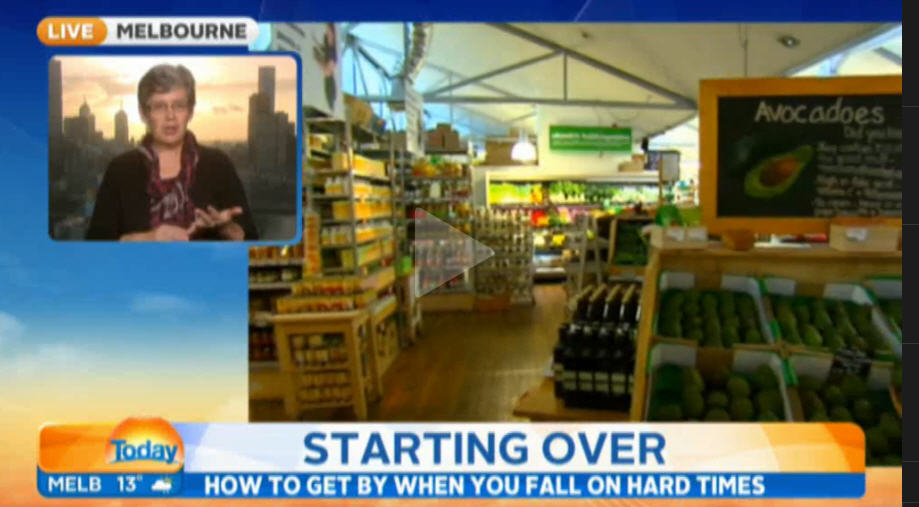|
Julia writes
"I've just joined Cheapskates (in November), so am relatively new and loving every minute. I'm a little overwhelmed at all the information and struggling to really start. My DH and I have set goals to clear our CC debt this year and to increase our mortgage payment by $120 a week (an extra $6,240 paid off this year!) and on paper we should be able to do it, but our money just seems to disappear - hence joining (we need the inspiration and the motivation). Do you have any suggestions to new members where to start? For example, I have the forum always open, joined the Saving Revolution and bookmarked Tip Store pages so I can refer back to them. Does anyone have any other suggestions we can use to reach our goals this year? What do other members do to get the best out of Cheapskates?" Do you have the answer? If you have a suggestion or advice for Julia, let us know. We'll enter your answer into our Tip of the Week competition, with a one-year membership to the Cheapskates Club as the prize too. Kate writes
"My husband and I have two small kids – 5-1/2 and 2 years old. I work 3.5 days a week and my husband works full-time. We have an investment property (we're paying interest only on the mortgage as our accountant advises) and we live in a rental property. My question is, do any of your members have any recommendations about how to save and create harmony when I VERY much want to save money to buy a family home for us to live in and my husband, who is a spender, isn't prepared to have a conversation about budgeting or saving? I know that $$ is one of the main things that people argue about and otherwise our relationship is great, but I want to have security for our kids and build towards our retirement." Do you have the answer? If you have a suggestion or idea for Kate let us know, by leaving it in the comments below. We'll enter your answer into our Tip of the Week competition, with a one-year membership to the Cheapskates Club as the prize. And keep an eye open, you may even see your answer in next week's newsletter. Dianne asks
"My husband and I have been married for five months, and are currently living with his parents. This is their wedding gift to us, so we can save as much as possible as a deposit on a home of our own. They offered us rent and utility free living for two years, which we are grateful for. The problem is grocery money (of all things!). Because of our work schedules, my MIL also does the grocery shopping and cooking (she's a great cook, I'm learning heaps) and we split the bill 50-50. Here's the rub: she does all the grocery shopping Coles and refuses to go anywhere else. She doesn't look for markdowns or specials, and flatly refuses to even consider generic brands. Last month our share of the grocery bill was $1,365 - even living rent free, we can't afford that! How can I , at 25 years old and a newlywed, tactfully introduce the idea of smart and frugal, budget shopping without any offence to my mother-in-law, who has been a housewife for 30+ years and has never needed to budget? Do you have the answer? If you can help Dianne let us know, by leaving it in the comments below. We'll enter your answer into our Tip of the Week competition, with a one-year membership to the Cheapskates Club as the prize. And keep an eye open, you may even see your answer in next week's newsletter. Ingredients:
2 flour tortillas or Mountain Bread* 2 corn tortillas or Mountain Bread* 2 tomato & basil tortillas or Mountain Bread* 2 spinach tortillas or Mountain Bread* Nonstick cooking spray garlic salt onion powder chili powder Method: Preheat oven to 200 degrees Celsius. Put tortillas on a clean surface and spray with cooking spray, then sprinkle with seasonings to your taste. Flip over, spray and season the other side. Pile the tortillas up on a cutting board and cut into quarters using a sharp knife, forming 4 triangles. Put the cut tortillas on baking sheets, being sure not to overlap any. Bake in preheated oven until crisp, about 5 to 7 minutes. Remove from oven and slide off onto a cooling rack. They will get crisper as they cool. *Mountain Bread can be bought at your supermarket or online. You can order online from www.mountainbread.com.au There is a minimum order of 8 packets of Mountain Bread. If 8 packets sounds a lot Mountain Bread can be used for wraps, as lasagne sheets and in place of tortillas as well as making really nice chips. Bear in mind that it has a shelf life of 60 days, and can be frozen for up to 12 months. You can also share an order with a friend, delivery is free. From the October 2011 Journal This morning I was up at the crack of dawn. Actually I was up well before the crack of dawn as I had to be in at Docklands at the Channel 9 studio for a Weekend Today segment. I left home at 6.35am and it was still dark, but being a Sunday the traffic was light and I had time for a coffee before I checked in.
When I took the call about doing this segment I was so excited. This is something I know about. It's something I've experienced. It's something I've lived through. It's the reason I started the Cheapskates Club. In the space of 72 hours we went from a two income family of four to a no income family of four with one on the way and half a house, waiting to be renovated, a mortgage to pay plus all the usual living expenses. It was a disaster. Like most people we knew we lived pay to pay. We had credit cards and we used them. We had a mortgage. And we had never heard of anything as sane and sensible as an Emergency Fund. To say we were stressed is an understatement. It took me six long months to get my act together and realise that we could sink and lose everything we had worked for or we could change our attitude and our habits and get through what I thought would be a temporary hiccup. As it turns out that was one long hiccup - three years in fact. We survived, and from that disaster we grew stronger and much, much wiser and learned some valuable life lessons too. Losing a job is a very stressful thing. But it's not the end of the world. You can control the way you react to job loss to ensure you come through stronger and happier or losing everything. Take Stock Firstly don't panic it is wasted emotion and energy. Take half an hour to sit down and take stock. Get out your budget and have a look at your bank account and Emergency Fund. Do a pantry, fridge, freezer and garden inventory and make a list of the meals you have in the house. This will tell you how long you can survive without an income and how long you have to find another job. It may be a month; it may only be a week. Either way you need to know how long your money will last. Stop Spending You would think this would be a no-brainer but there are those people who spend in times of emotional crisis, even though they know they shouldn't. You have nothing coming in to replace what you spend, so cut back on everything. Go back to the absolute bare essentials. No new clothes, toys, plants, books, eating out or takeaway, limit trips in the car to reserve petrol. If you do need to buy something look for the least expensive way: can it be bought second-hand? Could you get it free from Freecycle? Do you already have something that will do the same job? Will you find it at a garage sale or op shop? Be ruthless with your grocery shopping. When we lost our jobs the groceries were the first thing to be cut back. Cleaning supplies were the first to go, replaced with a bottle of generic white vinegar, a box of bicarb soda and some elbow grease. Then the processed foods went: biscuits and cakes, snack foods, cereals (except for Weetbix and rolled oats), most tinned foods. Brand names became a thing of distant memory. Generic labels became my best friends. If you have a favourite brand product and it has a cheaper alternative you are just going to have to suck it up and buy the cheaper alternative. You can't afford brand names. It's not forever, just until you get back on your feet. If you're not working you'll have more time to cook from scratch. Buying basic ingredients costs a fraction of the price of the ready-made foods so you can still enjoy your biscuits and cakes, muesli bars, snack foods and drinks. The difference, apart from the cost, will be that you made them rather than bought them. There are over 1,400 recipes in the Cheapskates Recipe File, all of them good. There is even a $2 Dinner category and of course the Bare Bones Groceries meal plan and shopping lists are on the Printables page. Go back to tracking your spending. It's all the little things you buy that do the most damage. By recording every cent you spend, on the newspaper, that can of soft drink, the groceries, the phone bill, the power bill, petrol and so on you'll see where the money is going and the areas that can be trimmed. Switch to a Cash Only Budget If you haven't already, stop using those credit cards. If you don't have the money to buy something, what makes you think you will have the money to pay for it when the credit card bill comes in? Now is not the time to be getting deeper into debt. Get on the Phone If you are going to be out of work for longer than two weeks, get on the phone and let your creditors know. Contact the credit card company, your mortgage lender and any other creditors and explain the situation to them. Let them know you want to continue to make payments and ask if they can be reduced for a limited time. Most creditors are sympathetic and understanding if you contact them immediately, before your accounts fall into arrears. Make Finding a Job Your Job Spend time every day actively looking for work. Register with agencies, look through the papers, and look online. Be brave and look at jobs that are new to you. Paper qualifications are good, but experience is valuable too. Don't think that you can't do a job because you don't have the paper that says you can. Of course there are exceptions to this, but for the most part experience and common sense are worth more than the degree. Get your resume up to date and have it ready to email with job applications. Get copies printed ready to take with you to interviews too. Answer your phone professionally when it rings, it may be your future employer. Don't let your personal grooming slide. This is your job until you find a new one. Keep Busy Depression will set in very quickly if you do nothing. Don't sit in front of the TV or computer all day. Get up each morning with a list of things to do. Look for work, weed the garden, paint the fence, fix the dripping tap, and clean the car, bake bread, volunteer at a local charity. Do not sit, idle all day, thinking about "poor me". It won't get you anywhere. Take Work that is Offered to You Now is not the time to be proud. If you are unemployed, you don't have an income. When someone offers you work, either temporary or permanent, take it. You need the money and the job. Look for part-time work - deliver pizzas, mow lawns, take in ironing. They may not be your dream jobs but they aren't forever. They are just to keep cash coming in. Wayne did all manner of things while he was looking for full-time work. He fenced paddocks, picked pumpkins and tomatoes, would get up at 3am to go out to a feedlot and put out the feed, ploughed paddocks and did odd jobs all over the district to earn some money. None of those things was even close to his trade, he did them because he had to have a job. Don't think that any job is beneath you. Work is work. Look at the Long Term Picture If you believe it is going to take more than a couple of weeks to find work (it took us over three years to find permanent, full-time work) you may need to think seriously about your lifestyle. Having money to pay the bills, put food on the table and keep a roof over your family's head are the top priorities. If you can't find any work you may need to sell some possession, downsize your home or car (or both), move to a less expensive area or change the children's schools. You may even need to move interstate, as we did. And Lastly Build an Emergency Fund As soon as you have an income start socking some of it away in an Emergency Fund. Years ago I would have said three months’ worth of living expenses was plenty. These days I suggest you aim for at least 12 months’ worth of living expenses. You won't be able to save that much straight away. Work at it every week. Start with just $10 if that is what you have and in a year you'll have $520. Add to it with bonuses, tax refunds, birthday money, money from garage sales - any extra cash that comes your way. An emergency fund gives you security and relieves the stress a financial hiccup, be it a week, a month or three years long, can cause. Although when it happens it seems like it is, financial hardship isn't the end of the world. When disaster struck us, I thought it would be the end of our hopes and dreams. Instead it turned out to be the best thing that ever happened to us. If we hadn't lost our jobs, with two little boys, a new baby on the way, half a renovated house, a mortgage and bills to pay, we would never have started living the Cheapskates way, learning how to live life debt free, cashed up and laughing and we would never have started the Cheapskates Club. From Debt Free, Cashed Up and Laughing When we started out on this journey it was all about frugality, with a little survival thrown in. Over time though, it has morphed into something else entirely. Yes, frugality is still a big part of our Cheapskates lifestyle, but it's not the main part.
I have come across and even met people who are so focussed on frugality that they have lost the joy in living. They are so focussed on saving money that they miss out on the things they would truly enjoy just to save a dollar. In their quest to save money they have become mean, and not just with their money, but with their sense of charity, their humour, their compassion, sympathy and empathy. They have forgotten why they chose to live a frugal life and live in loneliness and despair, scared to enjoy the fruits of their frugal ways. That's not what we're about. Yes, we deliberately look to save money. That's just commonsense. Why pay more than you have to for something? But we don't sit in the cold because it's not cold enough to turn the heater on (when is it by the way? I always say not before Mother's Day but that's just a guide). We don't strain our eyes by only having one 40 watt light bulb burning, and we don't risk stubbing a toe because we only have one light on at a time. And we most definitely don't starve ourselves or run the risk of rickets because we only eat mince and rice. Yes, I make my own washing powder (and if you haven't tried it may I suggest you do?). That's just commonsense. For around $10 and 5 minutes I can have enough of the best washing powder I've ever tried to last for a year. Why would I pay six or more times that price for a washing powder that makes my daughter itch unbearably and that causes us all to sneeze when we put clean clothes on? And I cook from scratch. I actually like it these days. Pre-Cheapskates I didn't enjoy cooking at all. These days I take pride in serving delicious meals to my family, knowing they are budget-friendly, as well as nutritious. When I look at the shelves and see the jars of jams, apricots, tomatoes and sauces sitting there I feel a little satisfaction, knowing that the fruits of my labours (literally) will feed my family in through the coming winter. So often the perception is that if you live life the Cheapskates way you don't buy anything new. You don't eat out or go to the movies, you don't have holidays, all your clothes are secondhand and your home is sparsely furnished with rubbish. We don't eat out every week, but we do eat out on special occasions. And we always enjoy the meal. I think it's because it is special, something different to our normal meals. There is the saying that what you don't cook yourself always tastes better, I think that's because it's a treat, something out of the ordinary. When we eat out we can afford to go somewhere fantastic because we don't do it regularly, we haven't used all our money on run-of-the-mill meals. We've saved for one truly special meal. And you know what? Most of the time it costs under $50 for the two of us, often with a voucher, sometimes without. Living frugally isn't about going without. It's about having the things you want, without the commonly associated debt. It's about seeing the difference between saving for a purpose and just saving. It's about understanding what is important to you and what is not. I see no point in saving the shards of soap, just to boil them down and re-mould them into another cake when I'd much rather have a nice bar of my favourite shea butter soap and really enjoy my shower and my itch-free skin. I do see the point in keeping them to grate into my laundry powder - they're being used up and saving me money. So, yes, it is about frugality. Frugality is important, without it we wouldn't be able to live the way we do. But it's not the most important part of our lives. We watch our pennies and look for ways to trim expenses because we like the end result - a debt free, cashed up life, where we laugh with joy every day. What I'm trying to say is that living the Cheapskates way isn't just about saving money. It's about changing your priorities so that you can live life debt free, cashed up and laughing too. Living on a budget is the key to financial freedom, but getting started can be frustrating. When we look at our expenses and see all of those bills we're paying every month, it's easy to throw our hands up in disgust. But what about all those little expenses we incur? You might be surprised to find out just how much they amount to.
It's easy to dismiss cutting back on little things. A few dollars a month won't make a significant difference in the big picture. But a few dollars here and a few dollars there adds up to a few more dollars. When you cut back in a lot of small ways, you could end up with a lot more money at the end of the month. From Debt Free, Cashed Up and Laughing I watched a fascinating documentary today about Warren Buffet, who takes turns at being the world's richest man with Bill Gates. It's called The World's Greatest Money Maker: Warren Buffet
Mr Buffet has a personal wealth that is estimated to be more than $37 billion. His company, Berkshire Hathaway is worth $150 billion, he owns a quarter outright. So what makes this billionaire different to all the other wealthy people in the world? His attitude to money. This man lives life frugally, he embraces the Cheapskates way of life and is proud to say so. He lives with his wife in the house they have lived in for over 50 years. He and his wife raised their three children in this home, and they were by no means spoiled. Indeed his son Peter tells the story of asking his dad for $5 so he go out with his friends and buy McDonalds for their dinner. His father gave him the $5, but he told him to bring the change back (which we have always done with our kids). He said it with a smile, but he meant it. He wanted the change. His wife clips coupons and shops on a budget. She runs the household on a strict budget and lights are turned off when no one is in the room, food isn't wasted and nothing is thrown away unless there is absolutely no other use for it. Bill Gates says of Warren Buffett "he has never ramped up his ability to consume". What a testimonial! he lives as he did when he had no money and was a struggling young husband and father! A lesson to learn for all of us. In this day and age of out of control consumerism, knowing the richest man in the world shuns it is an incredible example for anyone wanting to live the Cheapskates way and enjoy debt free, cashed up life. But for me the thing that sets Warren Buffet apart from other wealthy people is that he doesn't judge what he does by the standards of other people. Instead, he lives the way he does and works the way he does so he can enjoy the things in life that are important to him. Just like we do. I've always said we choose to not spend our money on things that aren't important to us so we have the money to spend on the things that are. It's why we are Cheapskates and live the Cheapskates way, to live life debt free, cashed up and laughing. This post was first published at Debt Free, Cashed Up and Laughing |
Archives
April 2020
Categories
All
|






 RSS Feed
RSS Feed